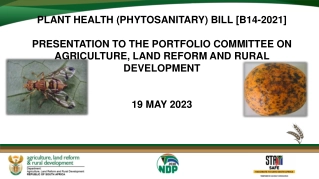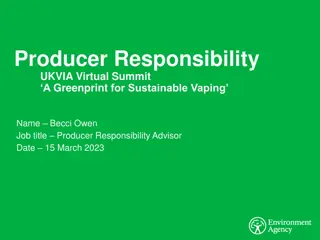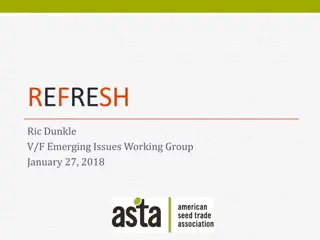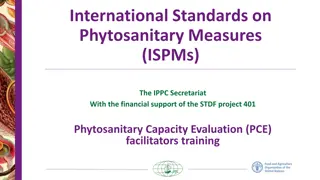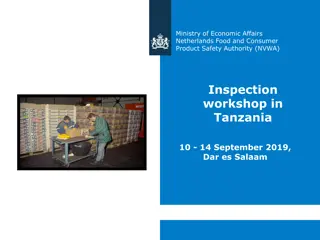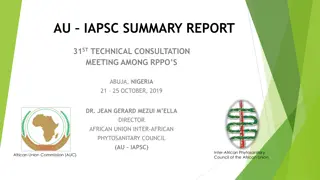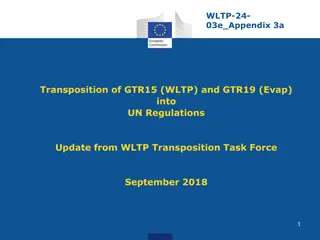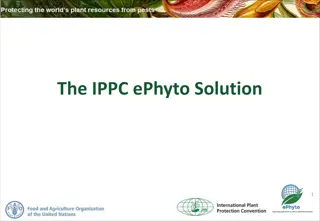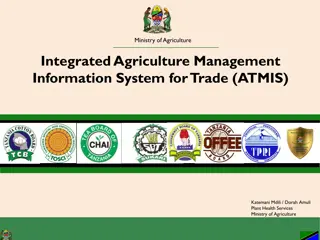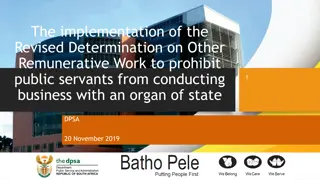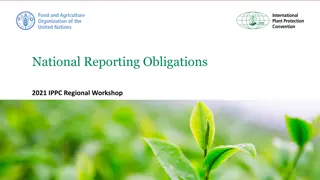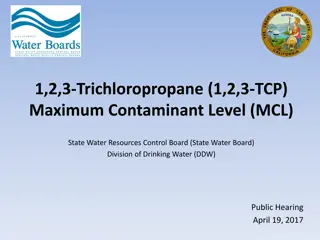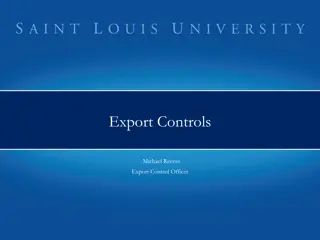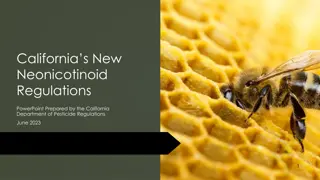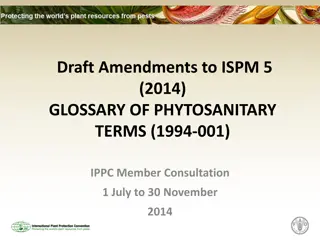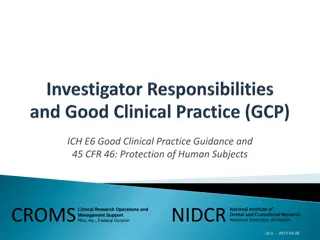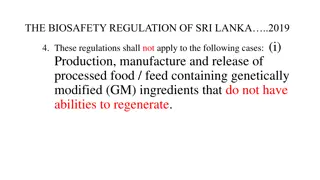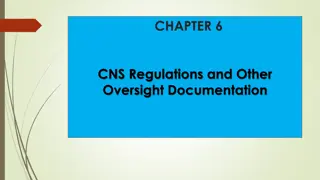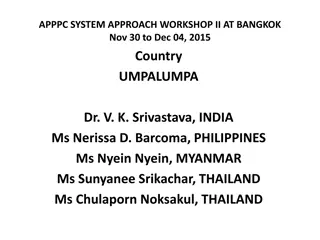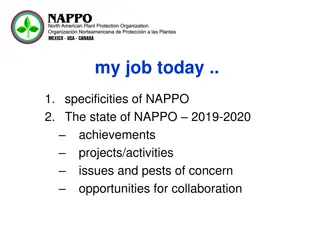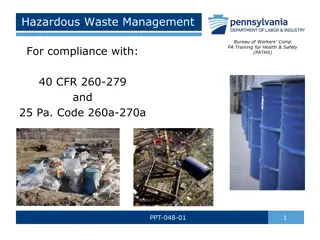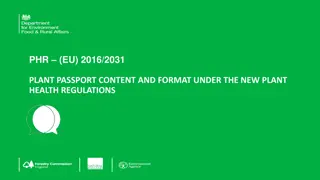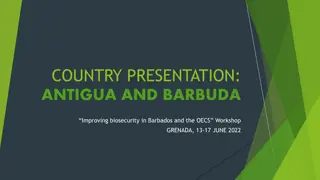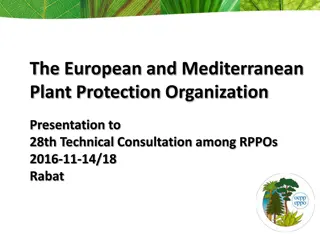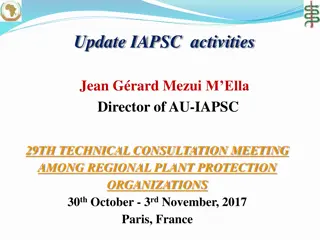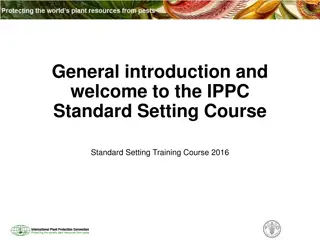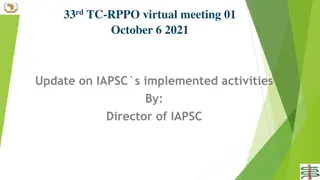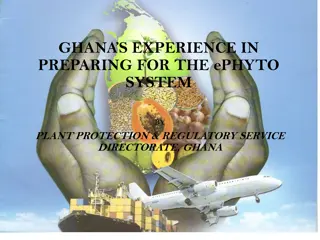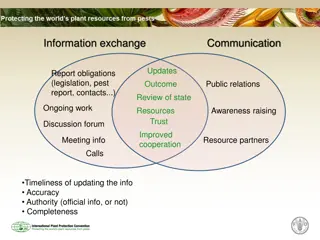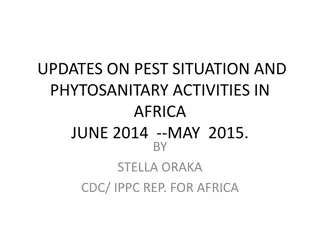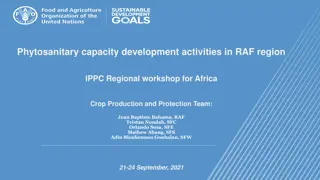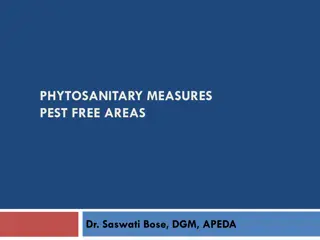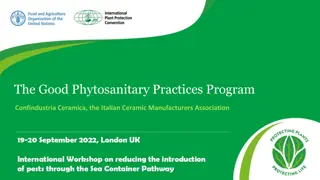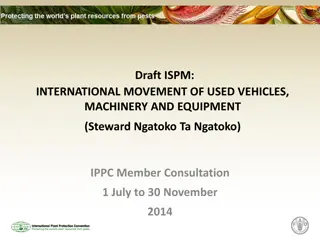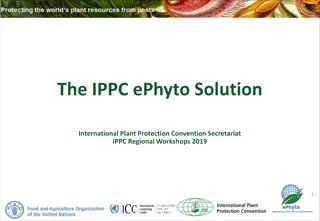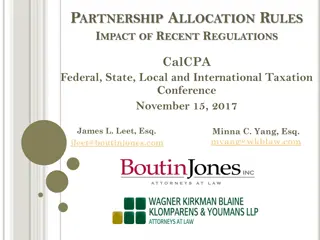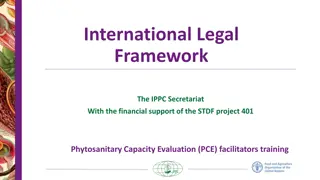Plant Health (Phytosanitary) Bill B14-2021 Presentation
Briefing the Portfolio Committee on Agriculture, Land Reform, and Rural Development on the Plant Health (Phytosanitary) Bill. Key concepts, problems addressed, historical timeline, and significance of the bill for South Africa's agricultural security are discussed.
1 views • 19 slides
Producer Responsibility in UK: Regulations for Sustainable Vaping
Producer Responsibility in the UK entails businesses taking accountability for the environmental impact of their products, including packaging, electrical equipment, batteries, and end-of-life vehicles. This responsibility extends to vapes as they fall under the Waste Electrical and Electronic Equip
1 views • 10 slides
Revolutionizing Seed Trade Regulations: The ReFreSH Approach
A new approach, ReFreSH, aims to enhance the efficiency of managing phytosanitary risks in international seed movements by shifting focus towards accrediting producers and production processes. This system seeks to accommodate all seed sectors and company sizes while promoting global adoption of bes
3 views • 20 slides
International Standards on Phytosanitary Measures (ISPMs) Overview
The International Standards on Phytosanitary Measures (ISPMs) play a crucial role in safeguarding global plant resources from pests. Spearheaded by the IPPC Secretariat and supported by the STDF project 401, these standards aim to enhance phytosanitary capacity worldwide. The ISPM framework covers k
0 views • 22 slides
Workshop on Phytosanitary Inspection in Tanzania by the NVWA
The Ministry of Economic Affairs Netherlands, in collaboration with the Food and Consumer Product Safety Authority, conducted a workshop in Dar es Salaam, Tanzania, focusing on improving inspection procedures and infrastructure related to phytosanitary issues. The workshop addressed key areas such a
0 views • 9 slides
AU-IAPSC Summary Report: 31st Technical Consultation Meeting in Abuja, Nigeria
Report on the 31st Technical Consultation Meeting among RPPOs in Abuja, Nigeria, detailing the activities and projected activities of the African Union Inter-African Phytosanitary Council. The report covers the background, introduction, and accomplishments of AU-IAPSC, emphasizing its mission to enh
0 views • 14 slides
UNR WLTP: Regulations Update for Vehicle Type Approval
This document details the transposition of GTR15 (WLTP) and GTR19 (Evap) into UN Regulations, focusing on the scope, definitions, and application for approval of vehicle categories M1, M2, N1, and N2. It outlines requirements for emissions testing, carbon dioxide, fuel consumption, electric energy c
0 views • 38 slides
Revolutionizing Phytosanitary Certificates Exchange with ePhyto Solution
This cutting-edge ePhyto Solution project aims to streamline the electronic exchange of phytosanitary certificates globally. By introducing a harmonized set of rules, it facilitates interactions among developing and developed countries, reducing paperwork, costs, and delays associated with manual pr
0 views • 22 slides
Withholding Taxes and Revenue Regulations Overview
The content delves into the concept of withholding taxes, particularly final and creditable withholding taxes, as per Revenue Regulations No. 02-98. It explains the responsibility of withholding agents, the distinction between final and creditable withholding tax systems, and the implications for pa
0 views • 20 slides
Revolutionizing Agricultural Trade: The ATMIS Project in Tanzania
Explore the innovative Agriculture Management Information System for Trade (ATMIS) project in Tanzania, a digital transformation initiative aimed at streamlining operations for traders in the agricultural sector. Developed in collaboration with various regulatory bodies and crop boards, ATMIS simpli
0 views • 17 slides
Implementation of Public Servants Business Prohibition Regulations
The presentation outlines the purpose and background of the Revised Determination on Other Remunerative Work to prohibit public servants from conducting business with state organs. It highlights measures in place, statistics on employee compliance, progress reports provided by departments, and the r
2 views • 21 slides
National Reporting Obligations 2021 IPPC Regional Workshop Overview
The National Reporting Obligations workshop focuses on the importance of implementing reporting obligations to control pests of plants and plant products globally. It covers general reviews, public obligations, bilateral obligations, and the role of IPPC contact points. The workshop emphasizes ensur
1 views • 34 slides
Regulations on 1,2,3-Trichloropropane (1,2,3-TCP) Contaminant Levels
State Water Board conducted a public hearing regarding the regulations on 1,2,3-TCP, a carcinogenic chemical found in groundwater. The proposed regulations aim to set Maximum Contaminant Levels (MCL) and other safety measures to protect public health. Stakeholder meetings and public workshops were h
4 views • 21 slides
Export Controls and Regulations in the United States
This content provides insights into export controls and regulations, covering topics such as Federal Export Control restrictions, definitions of U.S. Person and Foreign National, Technology Control Plans, Deemed Export discussions, and oversight by Federal agencies like the Department of Commerce, S
1 views • 20 slides
New Regulations on Neonicotinoids in California: An Overview
The presentation by the California Department of Pesticide Regulations highlights the new regulations on neonicotinoids, systemic pesticides affecting insects' central nervous systems. It provides insights into the history of neonicotinoid use in California, the development of alternative pesticides
0 views • 19 slides
Proposed Amendments to ISPM 5 (2014) Glossary of Phytosanitary Terms
The draft amendments to ISPM 5 (2014) Glossary propose additions and revisions to terminology related to phytosanitary measures. Changes include defining bark as a commodity, adding a declaration for regulated articles, and distinguishing between grain and seeds as commodity classes. The updates aim
0 views • 8 slides
Clinical Research Guidelines and Regulations Overview
Clinical research encompasses various guidelines and regulations to ensure the protection of human subjects and the credibility of study results. Key aspects include Good Clinical Practice (GCP) standards, Title 45 of the Code of Federal Regulations (CFR) Part 46, and additional CFR sections for cli
1 views • 46 slides
GMO Regulations in Sri Lanka: An Overview of Biosafety and Prohibitions
Sri Lanka's biosafety regulations of 2019 exempt certain cases involving genetically modified (GM) ingredients in processed foods. The regulations outline prohibitions on the import, sale, and distribution of GM organisms as food without approval. Additionally, the regulations address risks in proce
0 views • 12 slides
Plant Quarantine and Phytosanitary Measures
Plant quarantine involves efforts to prevent the entry, establishment, or spread of foreign pests through legal restrictions on plant and plant product movement. It is crucial for safeguarding plant health, food production, and ecosystems. Phytosanitary measures aim to ensure the health of plants by
0 views • 33 slides
Development and Review of CNS Regulations for Civil Aviation Oversight
Regulations play a crucial role in ensuring safety and efficiency in civil aviation. This involves the timely development, review, and enforcement of regulations to keep pace with industry amendments. Different types of regulations, from restrictive to permissive, impact how oversight is conducted.
0 views • 34 slides
Exporting Plants and Plant Products: A Guide to PHEATS Scheme
Explore the journey of exporting plants and plant products in England & Wales, including the Plant Health Exports Audited Trader Scheme (PHEATS). Understand the roles, requirements, and benefits of PHEATS in facilitating the exports of high-frequency produce and cut flowers. Learn about the steps in
0 views • 15 slides
Information on Tomato Production Conditions and Export Requirements in UMPALUMPA, LUNAPAIS, and TRIFOUILLI LES OIES
Detailed information is provided on the conditions for tomato production in UMPALUMPA, LUNAPAIS, and TRIFOUILLI LES OIES, including temperature ranges, humidity levels, and seasonal variations. Additionally, the export requirements such as phytosanitary measures and quarantine pests for these region
0 views • 11 slides
NAPPO: Enhancing Collaboration and Plant Health Protection
NAPPO, a forum for Canadian, United States, and Mexican professionals, promotes harmonized approaches to plant health and safe trade. Through collaboration with strategic partners like IPPC and EPPO, NAPPO works on developing regional standards, hosting workshops, and engaging stakeholders to enhanc
0 views • 13 slides
Hazardous Waste Management Regulations in Pennsylvania
The hazardous waste management regulations in Pennsylvania outline compliance standards for handling hazardous waste, including storage, identification, transportation, recordkeeping, and emergency response. These regulations incorporate both federal guidelines under RCRA and state-specific requirem
0 views • 122 slides
Plant Passports in EU: Regulations, Requirements, and Differences
Learn about the Plant Passport (PP) system in the EU under the new plant health regulations. Explore the content, format, and requirements for issuing PPs, including the distinction between PPs and Phytosanitary Certificates (PCs). Discover the purpose of PPs, how to become authorized to issue them,
0 views • 23 slides
Enhancing Biosecurity Measures in Antigua and Barbuda for Agricultural Sustainability
Explore the initiatives undertaken by Antigua and Barbuda to improve biosecurity through workshops and organizational strategies, focusing on plant protection, pest management, and import permit regulations. Learn about the current procedures for import applications and phytosanitary certificates to
0 views • 16 slides
European and Mediterranean Plant Protection Organization Overview
The European and Mediterranean Plant Protection Organization (EPPO) was established in 1951 and has grown to encompass 51 member countries across Europe, North Africa, the Mediterranean, and Central Asia. EPPO focuses on plant quarantine and protection products, with a dedicated team managing variou
0 views • 22 slides
Update on IAPSC Activities: Technical Consultation Meeting 2017
This update highlights the achievements and initiatives of the International Association for Phytosanitary Capacity Building (IAPSC), focusing on capacity development, strategic planning, and coordination for plant protection in Africa. It discusses the outcomes of the 29th Technical Consultation Me
0 views • 20 slides
The IPPC Standard Setting Process - A Comprehensive Overview
Explore the IPPC standard setting process through this course, covering the steps involved, bodies and roles, and ways NPPOs can contribute. Gain insights into the roles of various entities like the Standards Committee, Expert Working Groups, and more. Understand the significance of the IPPC Secreta
0 views • 76 slides
Update on IAPSC's Implemented Activities in TC-RPPO Virtual Meeting
Technical Consultations among Regional Plant Protection Organizations are being held virtually due to the COVID-19 outbreak. This update covers activities implemented by IAPSC since the 32nd TC-RPPO meeting, including participation in various virtual meetings and workshops focused on plant health an
0 views • 10 slides
Ghana's Experience in Preparing for the ePhyto System by Plant Protection & Regulatory Service Directorate, Ghana
The presentation outlines Ghana's preparedness for the ePhyto system, including setting up the ePhyto, challenges, expectations for international trade, and conclusion. Ghana's National Plant Protection Organizations play a crucial role in ensuring phytosanitary certificates meet import requirements
0 views • 15 slides
Enhancing International Phytosanitary Information Exchange for Improved Cooperation
Enhancing international phytosanitary information exchange is crucial for promoting cooperation among National Plant Protection Organizations. The role of Regional Plant Protection Organizations (RPPOs) in coordinating activities and facilitating communication is key to achieving the objectives of t
0 views • 11 slides
Updates on Pest Situation and Phytosanitary Activities in Africa (June 2014 - May 2015)
Stella Oraka's report highlights the pest situation in Africa from June 2014 to May 2015. It covers the Locust Emergency Response Programme in Madagascar, the threat of Deadly TR4 Banana Fusarium globally, the invasion of Tuta absoluta in various regions, and the presence of Potato Cyst Nematode in
0 views • 16 slides
Phytosanitary Capacity Development Activities in RAF Region - IPPC Regional Workshop for Africa Crop Production and Protection Team 2021
Plant pests are spreading due to increased global movement, causing losses. FAO interventions focus on pest prevention, management, diagnostics, surveillance, and cooperation in Africa. Programs target major pests like Fall Armyworm, Desert Locust, and others in different subregions.
0 views • 12 slides
International Trade Agreements on Sanitary and Phytosanitary Measures
Phytosanitary measures, pest-free areas, and agreements such as the SPS and TBT aim to protect health and prevent trade barriers in international trade. The SPS Agreement focuses on sanitary measures based on risk assessment, while the TBT Agreement aims to prevent unjustified technical barriers to
0 views • 21 slides
The Good Phytosanitary Practices Program by Confindustria Ceramica
The Good Phytosanitary Practices Program by Confindustria Ceramica, the Italian Ceramic Manufacturers Association, focuses on promoting sustainable development and reducing the introduction of pests through the Sea Container Pathway. It emphasizes the pillars of sustainability and highlights the lea
0 views • 12 slides
Draft ISPM: International Movement of Used Vehicles, Machinery, and Equipment (Steward Ngatoko Ta Ngatoko)
This draft ISPM addresses the pest risks associated with the global movement of used vehicles, machinery, and equipment, offering phytosanitary measures for various sectors. It outlines the regulatory history, considerations, and appendices for reference. Specific guidance is provided to NPPOs regar
0 views • 7 slides
ePhyto: The Future of Electronic Phytosanitary Certificates
The IPPC ePhyto Solution Project facilitates electronic exchange of phytosanitary certificates, offering a harmonized set of rules for safe trade. ePhyto is the electronic alternative to paper certificates, ensuring secure issuance and approval by NPPO officers. This innovative system enhances globa
0 views • 19 slides
Impact of Recent Regulations on Partnership Allocation Rules
Recent regulations drastically impact partnership allocation rules related to determining partner liabilities, basis, disguised sales, and more. The regulations under IRC 704 have been revised, and changes have been proposed to reduce tax regulatory burden. The 2014 proposed regulations and the 2016
0 views • 43 slides
International Legal Frameworks in Phytosanitary Regulations
Exploring the international legal framework surrounding phytosanitary regulations is essential for understanding obligations placed on countries to protect human, animal, and plant health. Key aspects include international treaties, soft law instruments, the WTO SPS Agreement, and the role of the Wo
0 views • 20 slides
